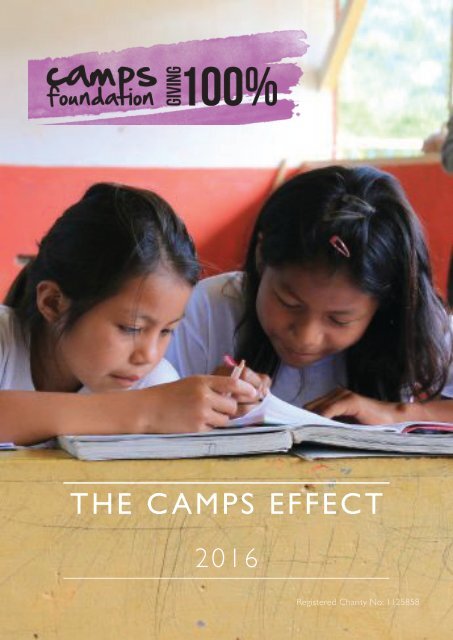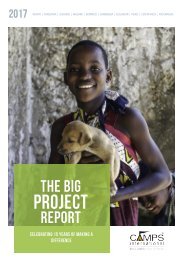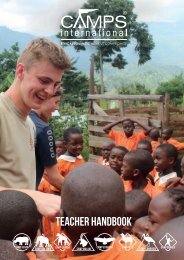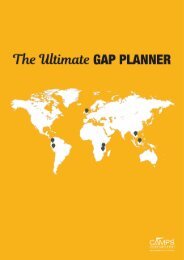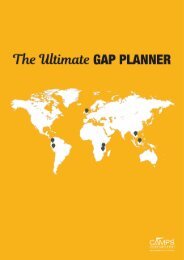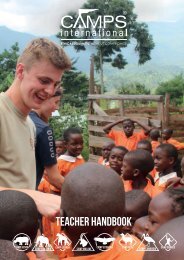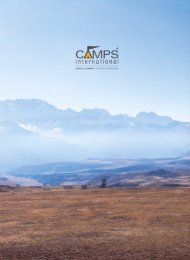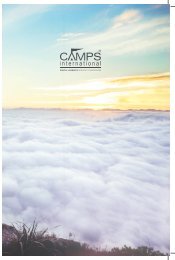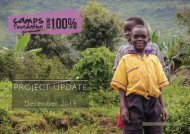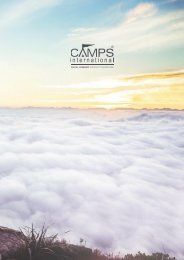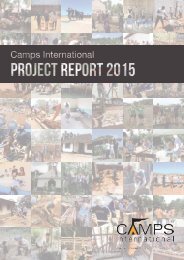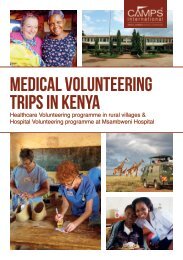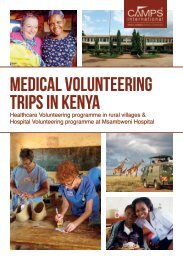The Camps Effect 2016
The Camps Effect 2016 gives you an introduction to the type of work we do, where we work, the unique way in which we fund our projects and exclusive news on some of our current initiatives, showcasing just how much our donors make a difference to people and wildlife across the globe.
The Camps Effect 2016 gives you an introduction to the type of work we do, where we work, the unique way in which we fund our projects and exclusive news on some of our current initiatives, showcasing just how much our donors make a difference to people and wildlife across the globe.
You also want an ePaper? Increase the reach of your titles
YUMPU automatically turns print PDFs into web optimized ePapers that Google loves.
THE CAMPS EFFECT<br />
<strong>2016</strong><br />
Registered Charity No: 1125858
Welcome<br />
Thank you for showing interest in the <strong>Camps</strong> Foundation.<br />
This guide gives you an introduction to the type of work we do, where we work, the unique<br />
way in which we fund our projects and exclusive news on some of our current initiatives,<br />
showcasing just how much our donors make a difference to people and wildlife across the<br />
globe.<br />
No matter how large or small your donation, you can always guarantee that every penny of<br />
the funds will go directly to our projects - this is our ‘Giving 100%’ guarantee, a promise<br />
that’s unique to <strong>The</strong> <strong>Camps</strong> Foundation.<br />
I hope you enjoy reading about the projects and I really hope it will inspire and encourage<br />
you to support us for a very long time. Together with your generosity we can really make a<br />
lasting difference to the people and environment that is so close to our hearts.<br />
If you have any questions, or would like to find out more, please don’t hesitate to contact<br />
us at projects@campsfoundation.org<br />
Here’s to achieving big things in <strong>2016</strong>!<br />
“We can’t help everyone,<br />
but everyone can help someone”<br />
Dr Loretta Scott<br />
Yours sincerely,<br />
Stuart<br />
“So far our projects have benefitted over 35,000 of<br />
the poorest people, supporting them towards a brighter<br />
future. We’re also protecting some of the most important<br />
wildlife habitat on Earth.<br />
- With your help, we can achieve even more this year. “
Contents<br />
Introduction to <strong>The</strong> <strong>Camps</strong> Foundation 6<br />
Where we work 8<br />
What we do:<br />
• Education 10<br />
• One Month, One Child 12<br />
• Housing 14<br />
• Healthcare & Sanitation 16<br />
• Food & Water Security 18<br />
• Environmental Protection & Wildlife Conservation 20<br />
• Sustainable Livelihoods 22<br />
Some of our Current Projects:<br />
• Ecuador 26<br />
• Kenya 30<br />
• Tanzania 38<br />
• Cambodia 44<br />
• Borneo 48<br />
Contact Information 54<br />
5
Introduction<br />
<strong>The</strong> <strong>Camps</strong> Foundation was established to provide vital financial support for the wide range of projects<br />
that <strong>Camps</strong> International commits to every year.<br />
At any one time, <strong>Camps</strong> International may be working on up to 100 different humanitarian, environmental<br />
and conservation initiatives across Africa, Asia and South America.<br />
By establishing this charity to work alongside the business, not only are we able to make long term<br />
commitments to a range of vulnerable communities worldwide through our volunteering trips, we’re<br />
also able to provide increased support to numerous projects that are independent of our volunteer<br />
programmes. This ensures that we maintain the balance between our commercial and philanthropic<br />
goals without one compromising the other.<br />
How does it work?<br />
<strong>The</strong> <strong>Camps</strong> Foundation is our way of demonstrating our unwavering commitment to the successful social<br />
and environmental change that has come about from the projects developed by <strong>Camps</strong> International<br />
since 2002.<br />
<strong>The</strong> company uses their resources on a not for profit basis to cover all charity administrative costs,<br />
salaries etc. so that every penny of every donation to the <strong>Camps</strong> Foundation is spent on projects.<br />
<strong>The</strong> <strong>Camps</strong> Foundation relies on donations from staff fundraising efforts, our family of committed exclients<br />
and friends.<br />
Who benefits?<br />
<strong>Camps</strong> International<br />
Support through commerce<br />
CI & local community<br />
work together to identify needs &<br />
priorities<br />
Donors<br />
Essential donations<br />
We work exclusively in rural villages and wildlife conservation areas where poverty levels are high and<br />
there is virtually no form of income beyond small-scale farming, to build capacity in areas that would<br />
otherwise never benefit from tourism. So far, our projects have benefited over 35,000 people, providing<br />
communities with employment and better access to education and healthcare.<br />
Our conservation projects are targeted to include four of the world’s top biodiversity hotspots and<br />
aim to increase the value of wildlife and habitats by working with communities to develop economic<br />
alternatives to over-exploitation of natural resources. This results in a reduction in conflict between<br />
people and wildlife, as well as encouraging environmental stewardship from the local communities.<br />
Agree aims &<br />
objectives<br />
<strong>Camps</strong> Foundation<br />
Resource<br />
locally<br />
Employ<br />
locally<br />
Local<br />
skilled<br />
expertise<br />
Build <strong>Camps</strong><br />
Projects<br />
Unskilled labour/<br />
vocational expertise<br />
International<br />
Volunteers<br />
LASTING IMPACT<br />
for people, wildlife<br />
& environment<br />
6 7
Where we work<br />
Ecuador<br />
Deforestation and the illegal pet trade are<br />
having a devastating effect in the Amazon<br />
rainforest.<br />
Lack of employment opportunities are<br />
driving young people out of rural areas<br />
in search of work, exacerbating rural<br />
poverty and degrading important cultural<br />
heritage.<br />
Kenya<br />
High levels of rural poverty (more than<br />
70%). Lack of adequate education &<br />
healthcare facilities, poor sanitation & lack<br />
of employment opportunities.<br />
Illegal wildlife poaching & the ivory trade<br />
is increasing, causing a catastrophic<br />
crash in wildlife (especially elephant)<br />
populations.<br />
Cambodia<br />
Chronic widespread poverty especially<br />
in rural areas. Inadequate educational<br />
facilities leads to poor school attendance<br />
and high drop out rates, reducing<br />
employment prospects.<br />
Uncontrolled deforestation threatening<br />
Cambodia’s remaining wildlife and<br />
threatening food security.<br />
What we do<br />
Peru<br />
Geographic isolation means rural<br />
communities are lacking clean water &<br />
cannot produce enough food. Leads<br />
to high malnutrition levels, stunted<br />
growth & development in children, and<br />
poor sanitation, thereby increasing the<br />
prevalence of preventable and treatable<br />
diseases.<br />
Tanzania<br />
Very high levels of rural poverty (more<br />
than 80%). Lack of sustainable<br />
employment opportunities. Inadequate<br />
school and healthcare facilities. Many<br />
families and vulnerable people are<br />
homeless.<br />
Illegal wildlife poaching, unsustainable<br />
fishing practices and other human-wildlife<br />
conflict also a major concern.<br />
8<br />
Malaysian Borneo<br />
Rural poverty where more than a third<br />
of households do not have permanent<br />
access to clean water or sanitation. Poor<br />
education facilities and little attention paid<br />
to schooling for young children (e.g.<br />
kindergartens).<br />
Widespread deforestation for oil palm<br />
industry has destroyed 20% of Borneo’s<br />
forest in the past two decades, home to<br />
highly endangered orangutans.
We work in areas of the world where poverty levels are high and access to a<br />
good education is very limited or non-existent. Young children are often denied<br />
an education because their family expects them to work instead. Others are keen to<br />
attend school but the poor education facilities available hamper their success and<br />
consequently, their ability to acquire a good job.<br />
We have built and renovated more than 50 schools and kindergartens, giving more<br />
children a chance for a proper education in a safe learning environment. Child sponsorship<br />
has enabled more than 100 children to continue on to secondary education and we<br />
support several teachers with their professional training and development. We believe<br />
that giving children a better start in life is the first step in breaking the cycle of poverty.<br />
Education<br />
11
We believe passionately that education is the foundation of a bright future. It gives<br />
children the opportunity to learn, improve their health and fitness, close the<br />
gap in gender equality, learn business skills and gain meaningful employment. So in<br />
February 2015 we launched our One Month One Child (1M1C) campaign, a responsible<br />
tourism initiative whereby we sponsor one child in our host countries for every month<br />
of volunteer travel.<br />
One Month One Child<br />
We supply each child with the equipment they will need to attend school such as a new<br />
school uniform, school bag and pencil case, 3 curriculum text books, a dictionary, a<br />
pocket atlas and a geometry set.<br />
Our campaign is unique among the tourism sector and we are extremely proud of its<br />
success over the past year. So far we have equipped 394 children with learning tools<br />
throughout South America, South East Asia and East Africa, and have invested over<br />
£11,000 of our profits in this initiative.<br />
13
Housing<br />
Poverty in rural areas of Kenya, Tanzania and Cambodia has led to a shortage of<br />
adequate housing, resulting in many thousands of children and adults surviving<br />
without shelter or living in unsuitable buildings that are liable to collapse. As most<br />
houses are built from local materials, they are particularly susceptible to adverse<br />
weather conditions such as flooding. When these dwellings are damaged or fall into<br />
disrepair, it’s the most vulnerable members of society that suffer the most. Children,<br />
the elderly or infirm are unable to provide the financial resources or labour needed to<br />
undertake the necessary repairs, leaving them without a roof over their head.<br />
That’s why we stepped in and offered to finance and build traditional housing for those<br />
most in need. We have provided hundreds of people with a safe haven, but there is<br />
almost a never-ending supply of people who need our help, so the more money we<br />
raise every year the more people we can reach.<br />
15
As many as 2.2 million children each year die from preventable and treatable diseases<br />
like diarrhoea and pneumonia because of inadequate sanitation or because they<br />
are too poor to afford proper medical treatment.<br />
Our global sanitation project has built more than 100 toilet blocks and washing facilities<br />
across Africa, Asia and South America. We want to ensure that every one of our schools<br />
and communities have access to proper sanitation to eliminate diseases caused by<br />
poor hygiene.<br />
Our healthcare outreach programme runs regular clinics, giving the poorest and most<br />
isolated communities an opportunity to receive free medical care and support. We also<br />
strive to improve medical facilities and foster skills and information exchange between<br />
UK medical professionals and regional clinics and hospitals in Africa and Asia.<br />
Healthcare<br />
& Sanitation<br />
17
Food & Water Security<br />
Rural poverty is on the rise and an increasing human population is putting pressure<br />
on natural resources and threatening food security. Around 800 million people in<br />
developing countries currently do not have enough food to eat or lack adequate access<br />
to clean drinking water.<br />
We work closely with communities to help improve the productivity of their land<br />
by controlling soil erosion, establishing flood prevention measures and introducing<br />
innovative farming techniques such as permaculture. Our greenhouse projects grow<br />
vegetable crops to enhance local food security and teach children about the importance<br />
of nutrition. Our ongoing livestock de-worming programmes improve animal welfare<br />
and protein yield for rural farmers.<br />
<strong>The</strong> aim of our water projects is to provide as many people (and animals) as possible<br />
with clean drinking water. Although this sometimes involves building water pumps and<br />
small reservoirs, we try to take advantage of natural weather patterns as much as<br />
possible to secure rainwater and preserve ground water. Gravity fed rainwater systems<br />
and large water tanks are most successful way we are achieving this.<br />
19
As many as 50% off all species on Earth are possibly heading towards extinction<br />
by the middle of this century. 99% of currently threatened species are at risk<br />
from human activities, primarily those driving habitat loss, over-exploitation and global<br />
warming.<br />
Our conservation projects are located in four of the world’s top biodiversity hotspots<br />
where we can make the most significant difference to the most vulnerable species.<br />
Much of our work involves reforestation and habitat protection.<br />
We also have a strong focus on finding ways to alleviate human wildlife conflict by<br />
increasing the value of wildlife and habitats to local communities. We do this by working<br />
together to develop economic alternatives to over-exploitation of natural resources.<br />
Our environmental education initiatives are essential for raising awareness, improving<br />
animal welfare and encouraging environmental stewardship from the local communities<br />
who live alongside wildlife.<br />
Environmental Protection &<br />
Wildlife Conservation<br />
21
We don’t believe in handouts. That’s why we work closely with each community to<br />
empower them to improve their own living standards. We have developed and<br />
provided ongoing support to a wide range of income generation activities including<br />
fishing, marine agriculture, farming, ecotourism, artisan crafts and forestry. This has<br />
enabled many people to run their own businesses and secure a brighter future for their<br />
families.<br />
One shining example of this comes from Tumaini Women’s Group in Kenya, run by<br />
the inspirational Mama Mercy. We constructed a much needed community centre for<br />
the group, which has enabled them to hold regular meetings, hire out the space for<br />
community functions, discuss topical matters and use their skills and knowledge to<br />
create sustainable small cottage industries. <strong>The</strong>se include making jewellery, bags and<br />
keyrings, elephant dung paper products, aloe vera soap and traditional clothing. <strong>The</strong><br />
centre has also become an essential training hub, enabling the women to gain new<br />
skills in art, computer literacy, tailoring and health and beauty.<br />
Sustainable Livelihoods<br />
23
Some of our<br />
Current Projects
Ecuador<br />
Puerto Rico Children’s Day Care Centre, Costa<br />
Budget: €21,621.62<br />
Background<br />
Puerto Rico community is home to around 600 inhabitants and is located along the beautiful southern<br />
coast of Ecuador. Whilst many of the neighbouring towns and villages have a thriving national tourist<br />
industry, this small fishing village has not yet benefited from the same fortune.<br />
Most men in the village work in the fishing industry and are away at sea for extended periods of time<br />
(up to 21 days in every month). Women work either as domestic staff or as farm workers, resulting<br />
in long hours away from the family home. This family dynamic is having a detrimental impact on the<br />
development and welfare of the young children in the village and is discouraging women from working,<br />
as there are very limited childcare options available.<br />
Childcare challenges<br />
For the past few years, a number of local children had limited access to a small day care centre that was<br />
run out of a rented space belonging to one of the families. However, this facility is no longer available.<br />
Our aim is to design and construct a purpose built day care centre suitable for babies and young<br />
children. <strong>The</strong> centre will include all the learning resources and furniture needed as well as toilets, a<br />
kitchen, a vegetable garden and greenhouse, and an outdoor play area.<br />
Lasting Impact<br />
• Construction of the new day care centre will enable women to earn income to support their households<br />
whilst leaving their babies and children in a safe and supportive environment<br />
• <strong>The</strong> centre will offer better development opportunities to young children through structured play and<br />
fun learning resources<br />
• Construction of a kitchen and vegetable garden will improve child health and nutrition, a significant<br />
problem in the poor communities of Ecuador that leads to stunted growth syndrome.<br />
Progress so far<br />
• <strong>The</strong> community is currently working<br />
with the municipality to prepare the<br />
land for construction<br />
• Local residents will provide much of<br />
the labour<br />
• Environmentally sustainable building<br />
materials such as bamboo are being<br />
locally sourced<br />
• Work will officially start with gap<br />
volunteers in June <strong>2016</strong> and team<br />
clients in July and August <strong>2016</strong>.<br />
Building plans for the new daycare centre<br />
27
Ecuador<br />
San Pablo Urco Rainwater Harvesting & Reforestation, Kuri Kucho<br />
Budget: €20,270.27<br />
Background<br />
<strong>The</strong> community of San Pablo Urco sits more than 3,000 metres above sea level and is located close<br />
to a water source from the Cayambe volcano. However, despite this proximity, the bulk of the water<br />
is diverted to commercial flower farms and areas of greater population density, leaving the community<br />
without a reliable source of fresh water.<br />
Prolonged drought<br />
For the past year this farming community has endured severe drought conditions, leaving them without<br />
enough water to survive. Many livestock have perished and agricultural crops have failed. Moreover,<br />
long term deforestation in the area has reduced the productivity of the ground due to lack of essential<br />
nutrients and an inability to retain rainwater.<br />
We are building a rainwater harvesting system in the houses of the poorest families and in the local<br />
school. <strong>The</strong>re will also be an extensive programme of reforestation in the village to prevent further soil<br />
erosion and ameliorate their drought problem. <strong>The</strong>re is no government funding available for this project,<br />
so the community are solely reliant on us.<br />
Lasting Impact<br />
• Construction of the rainwater harvesting system will dramatically improve the lives of the community<br />
by increasing available water consumption, reducing the amount of time women and children spend<br />
collecting water and associated health risks<br />
• Improving access to fresh water will also enable the community to farm successfully and provide for<br />
their families<br />
• This successful water project is further supported by our previous work in building a school<br />
greenhouse and teaching children about nutrition to improve health and welfare.<br />
Progress so far<br />
• We have already started a programme of<br />
health and nutrition awareness in the local<br />
school<br />
• Work has started on the reforestation of 1,500<br />
native trees<br />
• We have researched the best and most cost<br />
effective water harvesting systems for the<br />
area. <strong>The</strong> system is constructed with cheap<br />
and readily available materials.<br />
29<br />
Example of the concrete water harvesting tank
Kenya<br />
School improvement, Sports development & Feeding Programme,<br />
Sasenyi<br />
Overall Budget: €19,918.21<br />
Background<br />
Building the new classroom block at Sasenyi Primary School<br />
Sasenyi is located on the outskirts of Rukinga wildlife sanctuary within the Taru desert. People here are<br />
desperately poor. Most households survive through subsistence farming but this region is seasonally<br />
very dry and water and food shortages are an everyday occurrence. <strong>The</strong>re are currently 720 students<br />
enrolled at Sasenyi Primary School where facilities are woefully inadequate; there are only 10 functioning<br />
classrooms and eight teachers. Since 2008 we have made significant improvements to the school<br />
infrastructure but there is still a lot of work to do.<br />
Classroom building & refurbishment €1,531.44<br />
<strong>The</strong> infrastructure and educational facilities are very dilapidated and erosion from seasonal flooding<br />
threatens the structure of the classroom foundations, making them liable to collapse. As well as ongoing<br />
improvements and refurbishment, we’ve agreed to build an additional classroom with adequate space<br />
to accommodate 90 young students who are currently taught in a single small classroom.<br />
Sports development €346.15<br />
Sports development can play a crucial role in developing young people physically, socially and emotionally<br />
by improving health and fitness, problem solving, boosting self-esteem, fostering social competence and<br />
supporting academic achievement. At the moment, rural schools do not receive any funding for teaching<br />
sports. By constructing sports facilities, providing equipment and establishing a continued programme<br />
of coaching, children can nurture their talents and improve their future employment opportunities.<br />
Before (above) and after (below) new sports equipment provided to the students<br />
Feeding programme €18,040.62<br />
In recent years, prolonged drought conditions have resulted in deteriorating food security in the area.<br />
Most family members are living on one small meal every 24 hours and more than half of the children<br />
are suffering from malnutrition. Until 2012, the school benefited from a government funded feeding<br />
programme but now this community are solely reliant on us funding and maintaining this critical<br />
programme that enables each child to receive one hot meal a day at school.<br />
Lasting Impact<br />
• Continuing school improvements provide the children with a clean and safe academic environment<br />
in which to thrive<br />
• Our support has already resulted in dramatic increase in attendance and student performance<br />
• Sports development improves student health, well-being, academic performance and future job<br />
prospects<br />
• <strong>The</strong> school feeding programme is essential for the health of the children, guaranteeing they receive<br />
at least one proper nutritious meal a day<br />
• <strong>The</strong> local education authority has agreed to supply an extra teacher if we build the classroom<br />
Progress so far<br />
• We’ve already constructed several classroom blocks, tackled soil erosion and installed water<br />
harvesting systems at the school<br />
• Foundations, walls and some of the roof are in place for the new classroom.<br />
31
Kenya<br />
Administration block, Itinyi<br />
Budget: €2,500.91<br />
Background<br />
Itinyi is located within the Taru desert close to the Tsavo National Parks. This area is seasonally very arid<br />
and food and water is scarce. <strong>The</strong> community struggles to survive here as water and food is scarce and<br />
most families are living below the poverty line due to very low income jobs.<br />
As with Sasenyi, the primary school is under resourced and although they have received limited<br />
government funding, the school board are unable to raise the funds needed for upkeep and expansion.<br />
Currently the school has 550 pupils with eight classrooms but more children who wish to attend school<br />
are unable due to lack of space.<br />
More space for learning<br />
In 2012 we built a classroom block which later was converted into a staff room office, leaving a class<br />
of 70 students crammed into a small room. <strong>The</strong> aim of this project is to provide the teachers with an<br />
administration office and staff room where they can meet and store teaching equipment, thereby freeing<br />
up the classrooms they’re currently using.<br />
Lasting Impact<br />
• Academic success is linked with good education resources and enables children to move on to<br />
further education and better jobs<br />
• A purpose build administration block will free up classrooms to ease student overcrowding and<br />
improve their learning experience.<br />
Progress so far<br />
• Foundations and lower walls are in place for the new staff block.<br />
Foundations being laid for Itinyi Administration block<br />
33
Kenya<br />
Wildlife Conservation & Marungu Tree Nursery, Rukinga<br />
Budget: €672.12<br />
Background<br />
Rukinga Wildlife Sanctuary lies between Tsavo East and Tsavo West National Parks in southeast<br />
Kenya. Wildlife Works converted this land into a wildlife sanctuary in 1998 after many problematic<br />
years functioning as both an important wildlife migratory route and a working cattle ranch. <strong>The</strong> land<br />
had become barren from overgrazing and poachers were destroying what little wildlife was left. Now<br />
the sanctuary is thriving again and is home to more than 50 species of large mammal, many of which<br />
are endangered including elephants, Grevy’s zebras, cheetahs, lions and African wild dogs. <strong>The</strong>re are<br />
also more than 300 species of birds residing in this important wildlife haven. However, the sanctuary<br />
faces continuous challenges from ivory poachers, illegal deforestation and conflict between farmers<br />
and wildlife, resulting in the need for constant restoration and protection if rare wildlife is to continue to<br />
flourish here.<br />
Living together peacefully<br />
Human wildlife conflict remains a big problem. <strong>The</strong> human population surrounding the sanctuary is<br />
rapidly increasing (around 20,000) and competition between people and wildlife for precious resources<br />
such as water, food and space is fierce. Since 2008 we have supported the work of Wildlife Works<br />
and the Kenya wildlife Service by improving wildlife water holes, maintaining roads for anti-poaching<br />
patrols, helping farmers protect their crops using chilli fences and establishing environmental education<br />
workshops to highlight the importance of Africa’s wildlife and demonstrate how people and animals can<br />
co-exist peacefully.<br />
We’re also involved in indigenous tree planting in both Rukinga and Marungu hills in an effort to reforest<br />
damaged parts of the environment and provide a source of income for the local communities.<br />
Lasting Impact<br />
• Provides essential protection and support for some of the world’s most endangered animals<br />
• Mitigates human wildlife conflict<br />
• Reforests important areas of wildlife habitat as well as supporting the local community and helping<br />
to improve soil quality for future farming activities outside the sanctuary.<br />
Progress so far<br />
• Improved several wildlife waterholes to prevent<br />
the need for wildlife to stray into farmland<br />
• Planted over 30,000 native seedlings and<br />
aiming to plant a further 1,000 this year<br />
• Facilitated better anti poaching patrols through<br />
road repairs and maintenance<br />
• This is an ongoing project.<br />
Volunteers planting native trees for Marungu tree<br />
nursery<br />
35
Kenya<br />
Healthcare Outreach Programme, Marungu<br />
Budget: €4,160.01<br />
Background<br />
Many people in rural Kenya are living below the poverty line and access to proper healthcare is often<br />
limited or non-existent. Marungu has more than 5000 inhabitants and is located in the Tsavo region. This<br />
community has a couple of local hospitals and dispensaries but facilities are very poor and they do not<br />
have enough equipment or expertise to treat so many people. It is not uncommon for women to walk<br />
many miles with a sick or injured child in order to reach a decent medical facility.<br />
Lower life expectancy<br />
This situation has led to many children living in unsanitary conditions, and heavy intestinal worm burdens<br />
lead to stunted growth and disease. A lack of personal health education further compounds this problem,<br />
leading to a high number of young children suffering from malnutrition.<br />
UK nurses and doctors holding a series of medical clinics<br />
We provide ongoing free medical health outreach in Marungu through our team of UK qualified medical<br />
volunteers, who offer much needed support on personal health education and hygiene as well as<br />
treating a wide range of ailments and offering critical information exchange with local practitioners. We<br />
are also involved in improving medical infrastructure and providing essential drugs and equipment to<br />
local hospitals.<br />
Lasting Impact<br />
• Healthcare is an essential component of breaking the cycle of poverty and suffering<br />
• This programme will lead to a reduction in cases of illness, disease and mortality<br />
• Continuing improvement of medical facilities leads to better patient care.<br />
Progress so far<br />
• Outreach programme takes place annually but we would love this to become a more regular<br />
occurrence<br />
• Funding is needed to purchase drugs and other medical equipment including painkillers, antibiotics,<br />
anti-fungals, skin infection cream, laboratory test kits, malaria rapid test kits<br />
• Necessary to hire dental equipment, optical equipment and Red Cross field training first aid kit.<br />
Community receiving critical healthcare information and advice<br />
37
Tanzania<br />
Father Neville Classroom Construction, Mbokomu<br />
Budget: €2,931.14<br />
Background<br />
Foundations and lower walls being constructed by <strong>Camps</strong> volunteers at Father Neville Primary School<br />
Mbokomu is an inland community living in the foothills of Kilimanjaro in north eastern Tanzania. This<br />
region has some of the highest literacy rates in the country. <strong>The</strong>re has been an increase in primary<br />
school attendance in Tanzania over recent years, since the abolition of fees in 2001. However, access<br />
to good quality primary education facilities outside of the cities is very limited and few students continue<br />
to secondary school. It’s therefore vital that the young children of Mbokomu receive an effective primary<br />
education to support them in gaining employment once they leave school.<br />
Collapsing classrooms<br />
Father Neville Primary School in Mbokomu village is a large school with more than 520 pupils. Basic<br />
school facilities are very run down and the community do not have the financial resources to update<br />
them. Recently four classroom blocks collapsed as a result of dilapidation, leaving the students with<br />
only two functioning classrooms that are safe to learn in. Consequently the children are taught either<br />
outside or in condemned buildings that are unsafe.<br />
Last year we completed a new classroom and furnished it with 30 desks. This year we want to finish<br />
building the classroom block so that the children can have a safe place in which to study.<br />
Lasting Impact<br />
• <strong>The</strong> new classroom block will provide the children with a safe and comfortable environment in which<br />
to learn, maximising the school’s capacity and the enthusiasm for learning shown by the children<br />
• It’s essential for the children’s safety that they are not forced to use the old dilapidated classrooms<br />
• Project will support their continued impressive academic performance, helping to break the cycle of<br />
poverty in the area.<br />
Progress so far<br />
• Foundations and lower walls are in place<br />
• Still need to complete higher brickwork, roofing, plastering and furnishing of classrooms.<br />
39
Tanzania<br />
Fumvhu School Refurbishment, Kidia<br />
Budget: €1,279.93<br />
Background<br />
Fumvhu is a primary school in the village of Kidia, located at the foothills of Kilimanjaro. This rural<br />
community is very poor and relies on subsistence farming. More than 500 pupils currently attend the<br />
primary school.<br />
Crumbling classrooms<br />
Much like Father Neville School in Mbokomu, classroom facilities are in varying states of disrepair and<br />
the community do not have sufficient funds to improve school infrastructure.<br />
We’ve been working with the school since 2009, refurbishing school classrooms and providing additional<br />
facilities for the children to enhance their educational experience.<br />
Lasting Impact<br />
• Safe classrooms will protect the children and enhance their educational experience, giving them a<br />
head start in life.<br />
Progress so far<br />
• We have already started tackling the problem of soil erosion at the school by laying 800 soil bags<br />
across degraded areas, but there is much more to do<br />
• Several classrooms are showing large structural cracks with holes in the floors that need urgent<br />
repair<br />
• This project is ongoing.<br />
Soil erosion control measures<br />
New classroom floor<br />
41
Tanzania<br />
Subutuni Primary School & Village Housing, Tanga<br />
Overall Budget: €2,802.88<br />
Background<br />
Subutuni is a coastal lowland village in Tanga with a population of around 3,000 people. Almost every<br />
family here is living below the poverty line. Historically this community was dependent on small scale<br />
fishing, but since uncontrolled and illegal fishing practices have led to the near collapse of fish stocks,<br />
the community is struggling to survive. <strong>The</strong> nearest school is more than 4km away; too far for small<br />
children to walk the journey to regularly attend.<br />
Improving Education Facilities €2,116.11<br />
Elderly lady’s house is dilapidated and collapsing<br />
Initially we’re building a new classroom for the village that will be used as a preschool for children aged<br />
between 5 and 8 years old who cannot walk long distances to attend school. Ultimately, we want to<br />
establish a primary school at Subutuni that will benefit around 3,000 people and aims to promote<br />
education development in the area.<br />
Houses for the vulnerable €686.77<br />
<strong>The</strong> high levels of unemployment in the village have led to chronic poverty and many people have been<br />
left homeless when their house falls into disrepair, especially the elderly or infirm.<br />
Currently there is an elderly lady whose house is close to collapse and so we have agreed to build her<br />
a new one.<br />
Lasting Impact<br />
New house construction underway<br />
• A preschool will dramatically improve education performance for young children giving them a better<br />
chance of continuing their education<br />
• <strong>The</strong> pre-school will generate employment in the area<br />
• Providing housing for the vulnerable within the village is essential to protect them from the harsh<br />
tropical climate and will reduce the risk of injury, disease and early mortality.<br />
Progress so far<br />
• This project has been extremely successful in our other locations<br />
• Building materials will be sourced locally to generate extra income for the village and the house will<br />
be build in a traditional style.<br />
43
Cambodia<br />
Classroom Construction & English Teacher, Beng Mealea<br />
Budget: €12,000<br />
Background<br />
School classroom construction underway at Beng Mealea<br />
Beng Mealea is a poor subsistence farming community situated 75km northeast of Siem Reap. Most<br />
people here are living below the poverty line, reliant on the production of rice for survival and selling off<br />
whatever is spare for additional income to supplement their diets. In rural Cambodia, poverty and harsh<br />
farming conditions add extreme pressure on families to restrict education for their children, yet there is<br />
still great enthusiasm for learning from the younger generation.<br />
Improving prospects<br />
<strong>The</strong> local school does not have an English teacher and English is not part of the standard curriculum<br />
in this region. However, with tourism a very much growing industry in Cambodia, being able to speak<br />
English can really help young people gain meaningful employment. This may involve staying in their local<br />
area and working as a guide at one of Cambodia’s many cultural sites, or enabling them to move to the<br />
city and work in the hospitality and tourism industry.<br />
We are constructing a block of two fully furnished classrooms to ease the growing pressure on the local<br />
school for space and to provide the community with a place to learn English. Each classroom will be fully<br />
sourced with learning materials and we will continue to pay for an English teacher to teach the growing<br />
number of children who are voluntarily joining these classes.<br />
Lasting Impact<br />
• Providing purpose built classrooms for the local children will ease overcrowding in the school, which<br />
is currently limiting the number of children that can attend<br />
• An improvement to education standards and student well-being<br />
• English literacy will create employment opportunities and reduce poverty levels<br />
• Offers a boost to the local economy through tourism.<br />
Progress so far<br />
• For the past year we have paid the salary for a teacher to teach English<br />
• Land for the classroom block has been kindly donated by the monks at the local pagoda. <strong>The</strong><br />
ground is cleared and foundation trenches are dug<br />
• Foundations and main support post are erected and we’ve just started on the walls.<br />
45
Cambodia<br />
Village Housing & English Teacher, Beng Pae<br />
Budget: €4,608.70<br />
Background<br />
Collapsing house that is home to a family of five<br />
Camp Beng Pae is located in the village of Ta Lek within the Beng Pae Wildlife Reserve. Most people<br />
are subsistence farmers, traditionally using the reserve to grow crops and harvest building materials<br />
sustainably. However, despite designation as a reserve, much of the land has now been cleared for<br />
commercial paper and timber companies, so the communities that rely on the forests for their livelihoods<br />
no longer have access to this precious natural resource. This has contributed to dire poverty with most<br />
families living below the poverty line.<br />
Homeless families<br />
Within the village it’s a common sight to find tiny little shacks not more than 3 x 3 metres made of grass<br />
and sticks as the only home available to families with up to nine children. Without any income or access<br />
to the forest, its impossible for households to afford the building materials required to upgrade their<br />
house.<br />
Construction of new house underway<br />
We have undertaken a programme to replace as many of these houses as possible with a simple<br />
concrete construction that can be built reasonably quickly but will provide a dramatically improved<br />
standard of shelter and security for families in need.<br />
As with Beng Mealea, we have also identified the importance of providing this community with an<br />
English teacher to help improve employment prospects for children and adults alike.<br />
Lasting Impact<br />
• Adequate housing is essential for the health and well-being of the community<br />
• By improving housing and sanitation, we can reduce incidences of disease and mortality<br />
• This project provides much needed local employment<br />
• English literacy will create employment opportunities and reduce poverty levels.<br />
Progress so far<br />
• Two houses have been completed and handed over to the families of Ta Lek<br />
• <strong>The</strong> third house based on a more robust updated concrete design is near completion and just<br />
awaiting the roof<br />
• <strong>The</strong> most needy families are prioritised by consultation with the village chief<br />
• <strong>The</strong>re are so many families in need that this will be an ongoing project for many years.<br />
Example of completed home<br />
47
Borneo<br />
Kindergarten, Bongkud<br />
Budget: €9,069.77<br />
Background<br />
Bongkud is a relatively large community comprising over 2000 people spread over two villages and<br />
lies 15km from Ranau. <strong>The</strong> level of state funding is inadequate for such a large population resulting in<br />
overcrowding, a lack of public resources and relatively high poverty levels.<br />
Construction begins on new kindergarten in Bongkud<br />
Shortage of kindergartens<br />
Although this community already has a small kindergarten, the population of young children is rapidly<br />
increasing and the current kindergarten is becoming overcrowded. Kindergartens don’t receive<br />
government funding in Borneo, so we have agreed to build them a new purpose built facility with plenty<br />
of space for the growing number of children who wish to attend. <strong>The</strong> building will also include toilets, a<br />
large outdoor play area, a shaded seating area, play equipment and a fish pond.<br />
Lasting Impact<br />
• Providing a kindergarten for the village will ensure a safe and stimulating environment where young<br />
children can learn and play<br />
• As soon as this project is completed, the previous kindergarten building (currently belonging to the<br />
church) will be re-purposed as a women’s centre.<br />
Progress so far<br />
• This project was started by school teams in 2015<br />
• Concrete foundations and roof support posts are in place<br />
• Block walls have started to go up and much of the inner floor is completed<br />
• Volunteers have levelled and landscaped the area, creating a storm drain around the site.<br />
Plan for new Bongkud kindergarten<br />
49
Borneo<br />
Community Centre, Tinangol<br />
Budget: €2,325.58<br />
Background<br />
<strong>The</strong> community of Tinangol resides in one of the poorest regions of Sabah, approximately 30km from<br />
Kudat. Most of the 100 households here survive through farming and selling their produce at local<br />
markets but it’s a tough existence for most. Education and welfare standards are well below the national<br />
average.<br />
Bringing the community together<br />
Community centres are commonplace in Sabah and form an integral part of village life. A well used and<br />
maintained community hall is often a good indicator of the health of the community itself.<br />
At the moment Tinangol does not have a community hall, making it difficult to hold village functions and<br />
resulting in the absence of an administration centre.<br />
We have agreed to provide the village with a community building and administration office to create a<br />
cohesive hub where people can get together, exchange ideas and rent out the space for functions in<br />
order to gain extra income.<br />
Lasting Impact<br />
• Community centre will bring the village together and provide a valuable service for all inhabitants<br />
• Instil a sense of community and cultural pride<br />
• Enable income generation activities to take place to alleviate poverty.<br />
Progress so far<br />
• Suitable land has been allocated within the village<br />
• Work is scheduled to start in summer <strong>2016</strong>.<br />
51
Borneo<br />
Community Centre, Timbang Batu<br />
Budget: €2,790.70<br />
Background<br />
<strong>The</strong> village of Timbang Batu is close to Tinangol, but the absence of a proper road leading to the village<br />
isolates this community and makes life even harder for its residents. <strong>The</strong> community is extremely poor<br />
and most of the villagers make a living from farming or from harvesting the ‘Nippa’ leaves from the<br />
nearby mangrove that are used as a natural roofing thatch on the traditional local long houses.<br />
Planning for the future<br />
<strong>The</strong> village is very spread out and so the village chief requested that we provide the community with<br />
a community centre so that they can gather, hold functions and support the village in becoming more<br />
organised and making a plan for their future development. <strong>The</strong>re was an old centre that was built many<br />
years ago but it is now completely dilapidated and needs to be rebuilt.<br />
Lasting Impact<br />
• Community centre will replace the dilapidated structure that is no longer in use<br />
• Enable income generation activities such as handicrafts to take place<br />
• Part of a long term plan of sustainable development.<br />
Progress so far<br />
• We have previously repaired and updated gravity water storage and piping in the village to provide<br />
every house with clean water<br />
• Teams have started demolition of the old structure and clearing the site<br />
• Work is scheduled to start in summer <strong>2016</strong>.<br />
53
For more information on the work of <strong>The</strong> <strong>Camps</strong><br />
Foundation or to donate, please contact:<br />
projects@campsfoundation.org<br />
or visit www.justgiving.com/campsinternational


